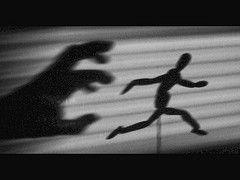Lots of kids are afraid of the dark. Whether it’s the boogeyman in the closet or a monster under the bed that’s haunting them, here’s how parents can help their kids conquer their fears.

Jennifer Bianco of Lincoln, R.I., has two
kids who are afraid of the dark. Her 6-year-old daughter absolutely must sleep with a blanket to help combat her fear, and her 4-year-old son insists on sleeping with a night-light.
Bianco isn’t sure when or why her children developed a fear of the dark, but she’s absolutely positive her kids' anxiety level goes up when the lights go down.
“What exactly they are afraid of when it’s dark I’m not sure, but I do know their fear is very real,” she says.
Millions of kids are convinced that something is lurking in the shadows waiting to gobble them up. Experts share with WebMD some theories on where the fear of the dark comes from, why it feels so real when you’re only 3 years old, and what parents can do to help their kids tackle their anxiety.
First Fears
“Some people expect that kids should never really have fear, and of course they do,” says Mary Dobbins, MD, a pediatrician and child psychiatrist in Springfield, Ill.
Fear is a normal part of life for all of us, including young children. It tends to start when you try something new, something that you’ve never experienced before, something that is an unknown.
For kids, this happens almost every day, so fear has a lot of opportunity to rear its ugly head -- especially at night.
“The fear of the dark tends to evolve around the time children are old enough to have a sense of imagination,” says Jenn Berman, PhD, a family therapist in Beverly Hills, Calif.
Usually, the fear of the dark hits home for kids around the ages of 2 or 3, when they’re old enough to imagine, but not wise enough to distinguish fantasy from reality, Berman says.
This gives the unknown an opportunity to turn scary. Add to that a blank slate of a young brain -- with no distractions to preoccupy the mind -- and a shadow in a dark corner of a child’s bedroom can easily become a three-headed beast.
“There are fewer distractions to keep a child’s mind occupied at night,” says Dobbins, who is also an assistant professor of pediatrics and child psychiatry at Southern Illinois University. “So instead, his imagination runs wild, and as a result, a kid who seems well adjusted during the day may be more vulnerable at night.”
Where Fear of the Dark Comes From
So what causes kids’ fear of the dark?
“Television is one of the worst offenders when we’re talking about a fear of the dark,” Berman says. “Parents don’t recognize how much TV can affect their children.”
The sights and sounds on TV are too stimulating for their brains, she says, exposing kids to things that might not be scary for an adult but are terrifying for a child.
Where Fear of the Dark Comes From continued...
“Most parents don’t limit what their kids are watching on TV,” Dobbins tells WebMD. “For instance, a young child, in a room watching TV with an older sibling, might be watching something totally age-inappropriate.”
Whether it’s a violent news story or even a popular cartoon program, both experts say that TV can give kids plenty of ammunition when it comes to fear.
Books are also culpable in creating nighttime havoc for a kid, Berman says.
The images can be intimidating and provoke already active imaginations, stirring up all sorts of ideas that can come back to haunt a child who is lying alone in the dark. From drawings of monsters to fairy tales and witches, kids can misinterpret images and conjure up fears that an adult might not recognize.
And surprisingly, another culprit when it comes to nighttime fears is a well-intended parent who tells a child, “You better behave, or the boogeyman will get you,” Dobbins says. Although it might seem like light-hearted discipline, this simple phrase can instill a solid case of nighttime heebie-jeebies for a kid.
“While most kids will have some degree of a fear of the dark as they’re growing up for whatever reason, the good news is, it can be solved,” Dobbins says.
Fear of the Dark: Dos and Don’ts
The best thing a parent can do for a child with a fear of the dark is to communicate, be respectful, and show that you understand.
“If you’ve been communicating with them from the start, they can understand when you talk to them about their fear of the dark,” Berman says. “And be respectful -- don’t tell them their fear is silly, because not only does it not help and they’re still scared, but now they feel guilty and ashamed, too.”
From calm, cool, and collected to recognizing something more is at play, here are dos and don’ts to fighting nighttime fears:
Do stay calm. “Be as calm as possible when you’re talking to your child about her fear of the dark,” Dobbins says. “Listen and make sure you don’t exaggerate and exacerbate to make it worse.”
Give the child a sense that she is safe, that she can handle her fear, Dobbins says. And give the fear a name. Explain to your child what fear is, and help her understand it’s normal.
Don’t get frustrated. “Reassure your child that his fear of the dark is normal,” Dobbins says. “But don’t get frustrated just because you know what he’s afraid of doesn’t really exist. Don’t say this is stupid or belittle or tease. While the monsters may not be real, the fear is.”
Fear of the Dark: Dos and Don’ts continued...
Do support your child. “Kids regress at night,” Dobbins says. “You may hear, ‘I want mommy,’ so let him know that this is OK, and you are there to help if he needs it.”
Don’t do sleepovers. Although it may be tempting to let your little one crawl into bed with you, resist the urge. “You still have to keep the boundaries that work for you and give your child the tools to cope with her fear,” Berman says. And that goes for siblings, too.
“It’s not your other child’s job to take care of his sibling,” Berman tells WebMD. “It’s your job as a parent, so trying to solve the problem by doing sleepovers in a sibling’s room isn’t the answer.”
Do empower your child. Give your child the power to tackle a fear of the dark. “Ask her if she wants daddy to check on her -- and let her decide what time makes her most secure,” Berman says. “Does she want to be checked on in 5 minutes, 2 hours? Whatever will help her feel better.”
And arm her with her comfort items, whether it’s a blanket, a stuffed animal, or a night-light, to help her sleep soundly.
Don’t play into the fear of the dark. “Don’t say to your child, ‘Let me make sure there aren’t any monsters under the bed,’” Dobbins says. “Or, ‘If you are a good boy, the monsters will go away.’ You are giving him the idea that his fear has credibility, and he won’t be able to get over it until he understands it honestly.” So when you check the closet for him, it’s to show him his clothes and shoes, not to make sure there aren’t any monsters.
Do make bedtime soothing. Television is a no-go at nighttime, and so are scary books, both experts say. Instead, focus on something relaxing, like some one-on-one time with your child.
Don’t ignore a larger problem. Stress in general, like divorce, the death of a pet, or the birth of a baby, can throw anyone off kilter and increase the risk for anxiety, even kids. As a result, that anxiety can appear at night as a fear of the dark, Dobbins says. If there are family issues at play, talk to your pediatrician and see whether it might be helpful for your child to talk to a counselor.
Do get help. With the support of an understanding parent, most kids can get over a fear of the dark in a few weeks. But if the fear lasts longer, Dobbins says it’s time for a conversation with your pediatrician to determine if its worthwhile for your child to get some help.
Read more about how to overcome a fear of the dark >>>
Good anti-fear book: Oscar's Starry Night. Buy online now >>>
Source







